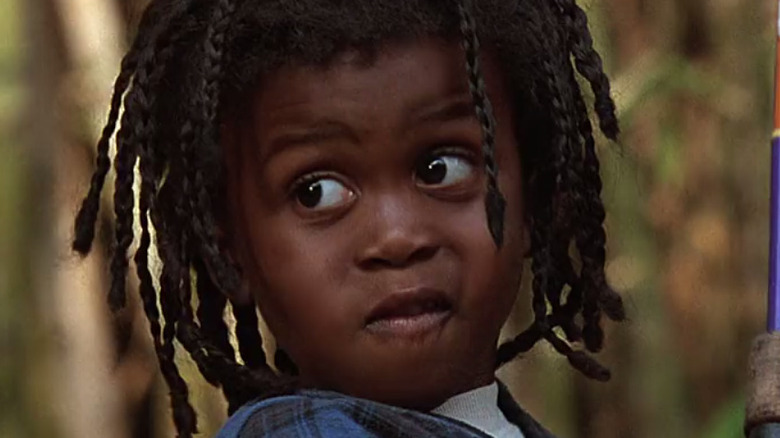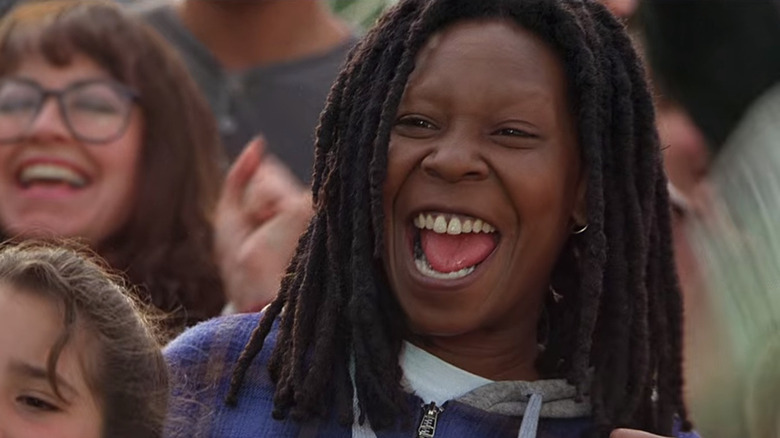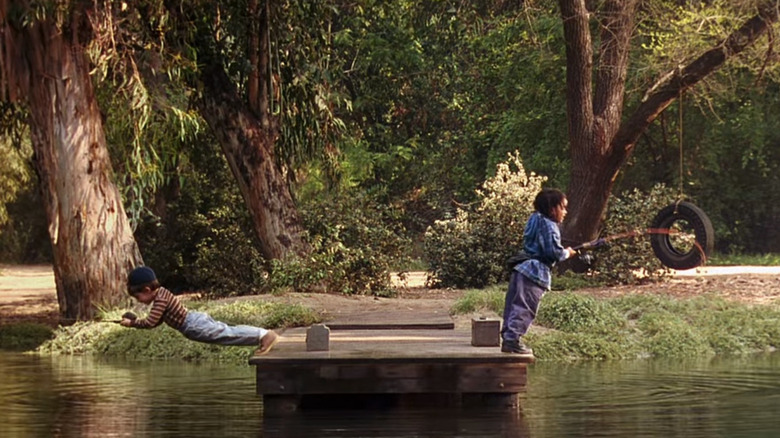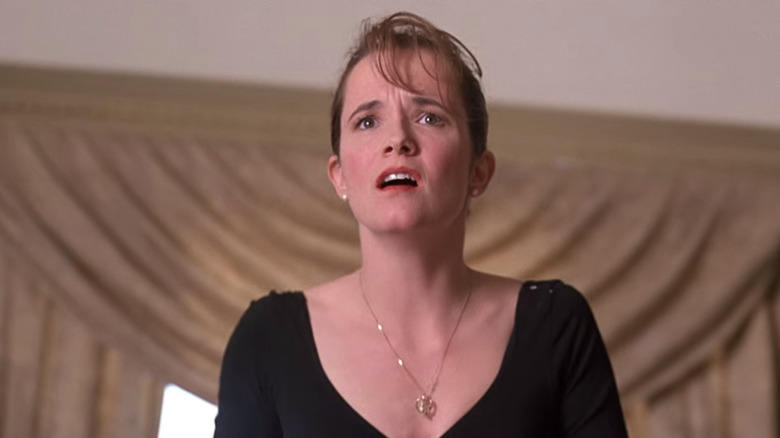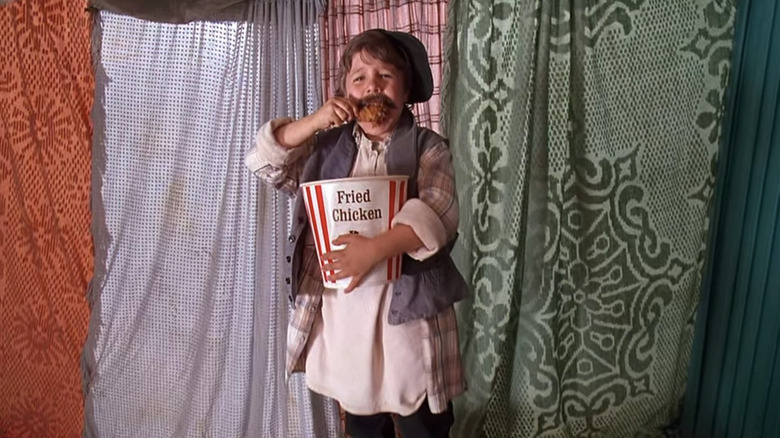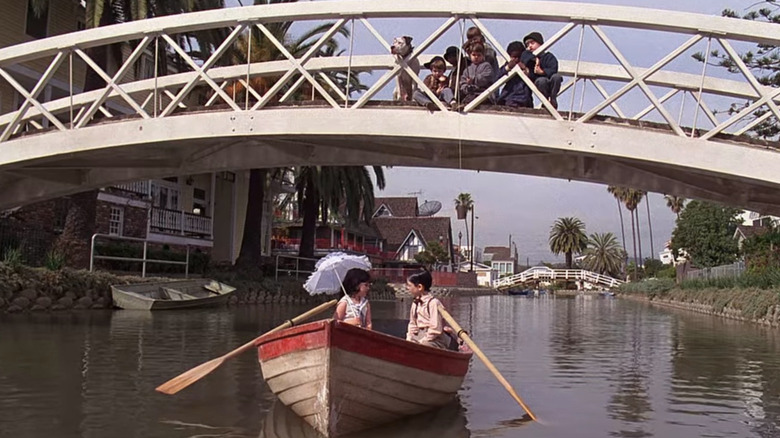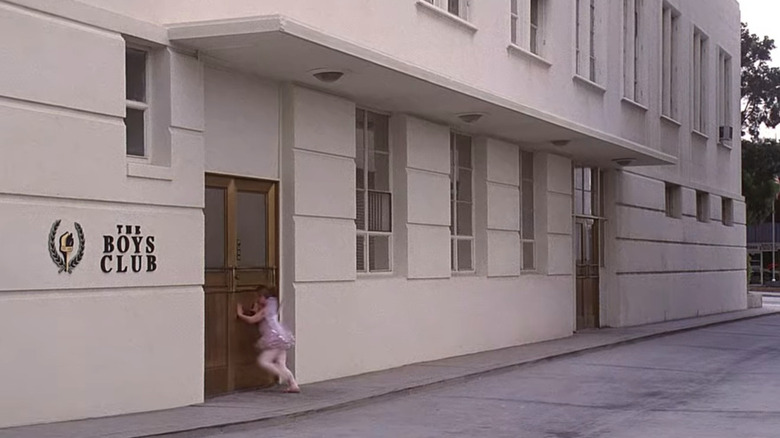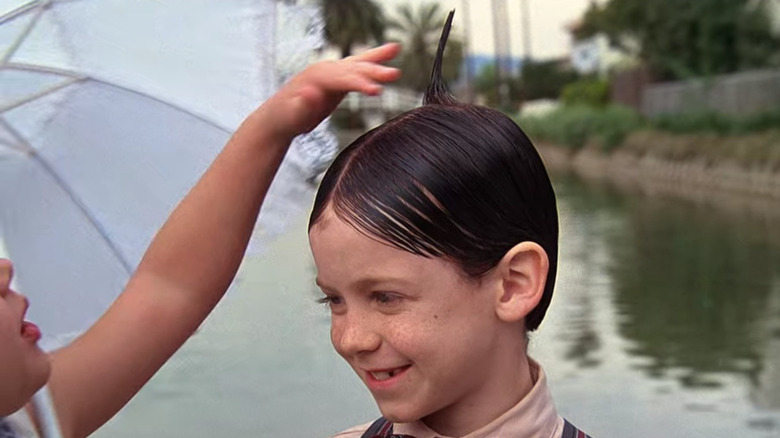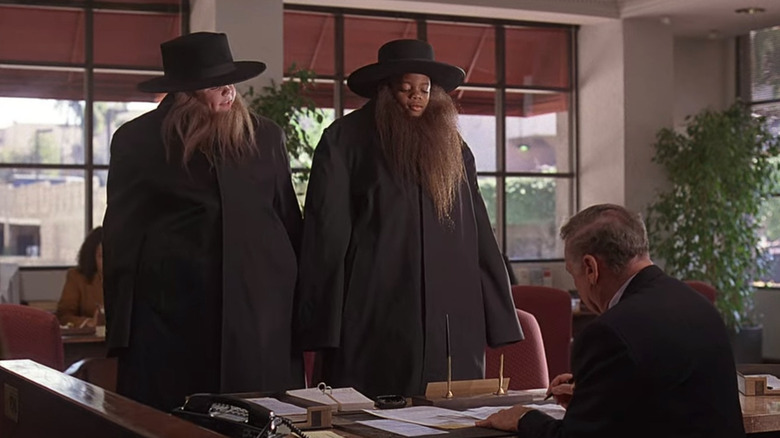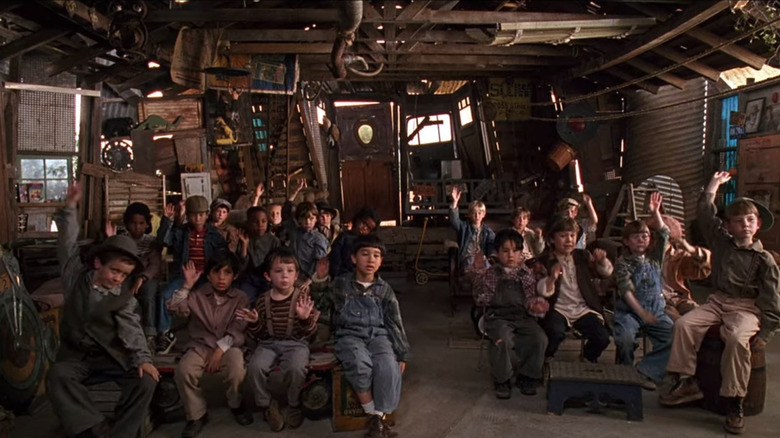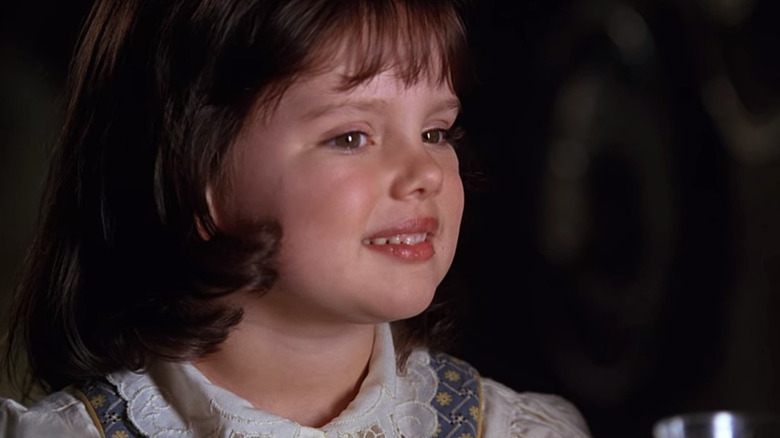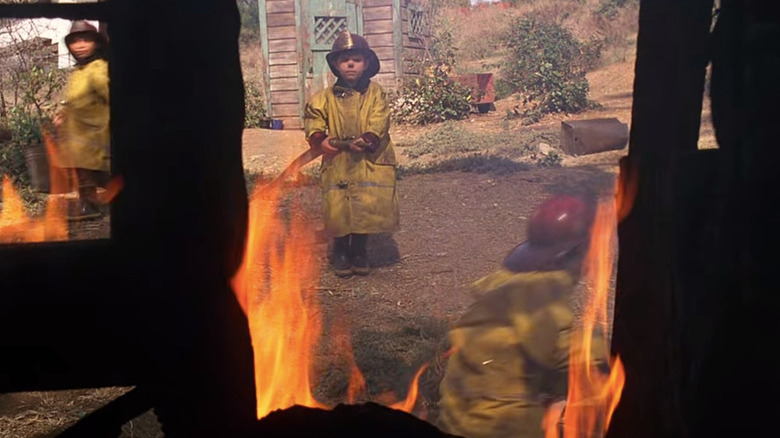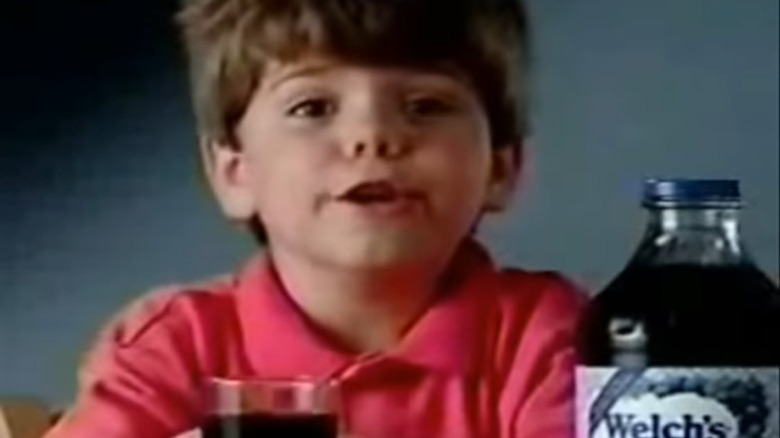Things Only Adults Notice In The Little Rascals
"Kids rule" was the rallying cry of 1990s children's entertainment. Nickelodeon programming of the era presented a slime-infused, poetically chaotic atmosphere where kids' imaginations dominated over their parents' rules. Chuck E. Cheese advertised its pizza/arcade/playground/birthday party fever dream establishments as places "where a kid can be a kid." The mascot of Toys 'R Us didn't want to grow up ... you get the idea. Elsewhere within this entertainment landscape, the 1994 film "The Little Rascals" imagined a summertime reigned over by a kingdom of kids with little supervision, endless possibilities, and a seemingly unlimited means of resources.
Within the primary conceit of "The Little Rascals" is a sense of humor found in its young child actors — all elementary-age and younger — behaving like adults. Their day-to-day lives, their social interactions, and their language are all stylistically adult-oriented, despite being performed by kids around age five. (It somewhat brings to mind the Netflix hit "Old Enough," the reality show in which toddlers are sent on adult errands.) With this as its premise, there are inherently a handful of things in "The Little Rascals" that only adults in the audience will notice.
The celebrity cameos
"The Little Rascals" includes a number of celebrity cameos. Some of the familiar faces are still prominent public figures nearly 30 years later and may or may not be recognized by younger viewers. Among these are Reba McEntire as the officiant of the big race, Whoopi Goldberg as Buckwheat's mom, and Donald Trump as Waldo's dad, all of whom appear in the finale sequence of the film. If viewers are too young to recognize these celebrities, though, their characters will seem as normal as some of the other adults in the film portrayed by less-prominent actors.
Furthermore, the surprise appearances of a few 1994-era child stars in "The Little Rascals" will probably go right over kids' heads today. Mary-Kate and Ashley Olsen — toward the end of their run on "Full House" and just at the beginning of their line of home videos — appear together at the girls' sleepover midway through the film. In one of the final scenes, Raven-Symoné — having concluded her run on "The Cosby Show," in the middle of her tenure on "Hangin' with Mr. Cooper," and nearly a decade prior to starring in "That's So Raven" — appears as Stymie's new girlfriend. Even if children of a modern audience are familiar with the Olsen twins and Raven today, they might not recognize their younger likenesses or realize what a big deal it must have been for kids in 1994 to see them on the big screen.
The music is familiar
"The Little Rascals" is based on "Our Gang," a series of short films from the 1920s to 1940s that later aired on television. Composer William Ross' score for "The Little Rascals" has an old-timey, symphonic quality that doesn't just bring to mind that era of early filmmaking, but directly borrows the "Our Gang" instrumental theme as part of its soundtrack. Older adults watching "The Little Rascals" might be transported back to their youth upon hearing the familiar theme again. Perhaps they have memories of seeing "Our Gang" on the big screen alongside news reels or Mickey Mouse cartoons during the golden age of Hollywood or watching its broadcast counterpart during the advent of the television set.
While a few moments in "The Little Rascals" are cartoony or whimsical, they're not fantastical. For the most part, the film is a series of vignettes that, while certainly silly, are otherwise grounded in reality. With a different composer at the wheel, the tone could feel quite different than the finished product. Ross' score elevates what could be ordinary moments with a certain level of sophistication, complementing the stylistically mature behavior of the kids.
A ruined dance recital
Lea Thompson plays Miss Roberts, the children's ballet teacher, in "The Little Rascals." She's understandably distressed when Spanky and Alfalfa spontaneously crash her meticulously planned dance recital. The boys are on the run from two bullies and wind up on stage after disguising themselves in ballerina outfits.
Adults can probably empathize with Miss Roberts' frustration. It's hard enough to teach kids that young a choreographed routine, even without any unexpected distractions. Anyone who's been to a dance recital featuring very young kids knows that children as young as the characters in "The Little Rascals" seldom stick exactly to the plan onstage, but that's to be expected and part of the charm of the performance. Two random kids causing havoc, though? Not so charming. Empaths who put themselves in Miss Roberts' shoes can quickly understand how she finds no humor in the situation.
A carnival sideshow lost in translation
In an effort to raise money for a new clubhouse, the boys set up an attraction at their local fair. True to form, they've gone all out, setting up their own covered exhibit and having Spanky stand outside as a carnival barker to beckon spectators. Shouting into a non-electronic megaphone, Spanky invites attendees to experience a wonder that not even science can explain: "the four-foot, man-eating chicken." This immediately paints a picture of quite a bizarre creature — perhaps seeming out of place in comparison to the rest of the movie so far, but hey, stranger things were known to happen in '90s movies.
As the camera cuts to the inside of the exhibit, the audience gets a laugh from what is discovered to be a misdirected set-up. It's technically what Spanky described, but some child-like assumptions might have been made in the boys' decision to spotlight this particular sideshow — it's not a "four-foot, man-eating chicken," but a "four-foot man, eating chicken." It's a kid standing on a box, literally eating a bucket of fried chicken. Ba dum tss.
Friendship tested by love
Spanky and Alfalfa are best friends, but their friendship quickly unravels when Alfalfa becomes smitten with Darla. It's all in the name, but the "He-Man Womun Haters Club" has a strict policy against girls. Alfalfa secretly dating Darla comes as a betrayal of trust to Spanky. They're hardly the first pair of buds to experience tension when a new romance enters the mix, but they're probably among very few kids their age to face this issue.
The dynamic is much more familiar to older viewers. We all know the drill. When one of two friends starts a relationship with a new third person, the established friendship takes on a new stage that might be challenging to navigate at first. It might take a few rounds of trying new things to figure out how these intermingling connections gel with one another without taking away from the individual relationships present among each person. But for this kind of maturity to be present among kids just barely on the verge of kindergarten? That's unknown territory.
Nowhere to hide
Toward the middle of "The Little Rascals," bullies chase a tutu-wearing Spanky and an underwear-clad Alfalfa through town. (It's a long story.) Spanky seeks refuge in the local chapter of the Boys Club. The camera remains outside, showing the exterior of the building while Spanky runs inside. Just as quickly as he enters, an adult dejectedly tosses him out, as if repulsed that Spanky would think he would be welcomed there.
This gag is a bit closed-minded, no matter what the viewer is supposed to assume of the man. If the adult knows Spanky is a boy and dismisses him just because he's wearing a ballerina outfit, that's not okay. If he thinks Spanky is a girl, his treatment of the child is still nonetheless rude, especially given the distress the kid is clearly in. Poor Spanky is only looking for someone to help him. The nuances of this interaction could either go over the heads of young viewers or do more damage in perpetuating harmful stereotypes than their intended humor is worth.
Meanwhile, Alfalfa experiences some trouble of his own in another moment that adults might discern better than kids. Still unclothed, he passes a Catholic church and runs into two nuns just outside the building. They're distraught at the sight of Alfalfa nearly streaking down the street, surely not something they would consider acceptable.
Alfalfa's sprout
Darla is the apple of Alfalfa's eye, and filmmakers took his infatuation with his first crush as an opportunity for surprisingly risque humor. Completely taken with Darla as the two of them romantically ride along a river together in a rowboat, the namesake strand of slicked hair on Alfalfa's head bolts upright just after he kisses Darla. It's even accompanied by a sound effect of a coil springing up. It's by far the most adult joke in the film, and somewhat out of place among the tamer jokes throughout the rest of the script.
The gag brings to mind when Pixar employed a similar moment in 1999's "Toy Story 2." As Jessie the cowgirl incredibly utilizes a Hot Wheels track to fling herself across Andy's room to open the door, Buzz Lightyear is awestruck... and then some. His wings stiffly and quickly emerge from their compartment on his back, a bit of symbolism that goes right over kids' heads.
Trouble getting a bank loan
Upon realizing that lumber to build a new clubhouse is going to cost a lot more money than they anticipated, the boys devise a plan. They figure their best shot is to apply for a loan, which in itself is a concept unfamiliar to most children. Just before the boys approach the banker (played by Mel Brooks, himself someone only adults will likely recognize), the camera shows said banker evaluating another application. "Six kids, hardworking father, honest and trustworthy," he remarks to himself. "Loan denied!" The delivery reads as a punch line, but it's likely to only seem funny to an older audience.
As part of the scheme, Spanky and Stymie disguise themselves as bearded adults, with the help of other boys hidden underneath long trenchcoats to make their height seem taller. After the banker turns them away, they encounter a duo of Amish men outside whose actual appearance is a near match of the boys' fake getup. One might imagine the banker will not be amused moments later when he thinks the pair has returned.
Purposefully but problematically misogynistic
Many of the qualities of the story and characters of "The Little Rascals" are satirically misogynistic. For starters, most of the main characters belong to the "He-Man Womun Haters Club" and a huge focal point of their personalities centers upon being mean to girls — specifically pledging to do so, in fact. Granted, "The Little Rascals" does, at times, go out of its way to strike down the very prejudices it perpetuates elsewhere. Spanky and Alfalfa are shocked, but unbothered, to discover their hero racecar driver, A.J. Ferguson (Reba McEntire), is a woman, not a man. Furthermore, at the end of the film, the boys delightfully welcome the girls among their ranks in their club. This resolution might seem too little too late, though, for parents concerned about the film's misogynistic aura, satirical as it may be. The Washington Post reported about an upset parent in 1994 who assessed that by the time the friendly ending came around, "the girl-esteem damage was done" upon his daughter.
Given the target audience, one has to wonder if young viewers will recognize the moments of satire for their true nature. In watching the boys' prejudice against the girls and the ways in which both groups conform to stereotypes, at what age would a viewer be able to tell the difference between what's supposed to be parody and what they take as an example for their own behavior? Where is the line between a joke that calls out a stereotype as harmful and a joke that itself adds to that harm?
An extensive vocabulary
Many of the kids in "The Little Rascals" speak in a way that sounds much more like adults than children, with a vocabulary that will simply be indiscernible to many younger viewers. This is one of the primary conceits of the movie, an intentional stylistic decision whose mileage varies. Sometimes the results are comical, such as when Alfalfa poetically remarks how he and Darla are "two hearts with but one beat." Other times the dialogue errs on the side of simply being absurd and requiring a wholehearted suspense of disbelief on the audience's part in being persuaded that any young child would know these words. For example, Spanky and Alfalfa hurl insults at one another in an argument to call each other a "Judas priest" and a "Muzak-warbling wimp." Even some adults might find themselves reaching for a dictionary.
Elsewhere, Spanky calls the boys' go-cart "the pride of our club." In a moment of crisis, someone suggests, "Maybe we should strap on the old feedbag." One kid compliments another's "physique." While perhaps funny at times to adults, one has to wonder if any such attempts come at the expense of alienating younger viewers who have no idea what the characters are saying as they recite words and phrases that no child their age would know.
How do these kids do all this?
Part of the inherent fantasy of "The Little Rascals" is how the group basically lives out every kid's dream. It's only the adults watching who will probably think of how this lifestyle works logistically. Who built the clubhouse in the first place? How do the kids seem to know how to run an organizational body like their club or hold a trial to settle civil disputes, but are so clueless about much less complicated systems? How did they get their many resources, from food for dates to an entire set of firefighter gear?
Additionally, the camera shows many wide shots that juxtapose a real city in very close proximity to the kids' community. The children, most of whom seem to be around kindergarten age, wander around unsupervised in a slow-paced environment that doesn't seem to match the bustling metropolis that wide exterior shots seem to suggest the film takes place near. Perhaps their neighborhood is a close-knit little haven of seclusion, as their parents seem to have no problem with letting the kids run amuck as they please. These observations are ultimately inconsequential, and their lack of answers doesn't speak to a lapse in storytelling clarity as much as it contributes to the childlike spirit of the movie.
A kid with a side hustle
Viewers who are adults now but were kids when "The Little Rascals" debuted in 1994 may recognize the actor who portrays Spanky, Travis Tedford, from another production that they can't quite place. If you just can't put your finger on where you've seen Spanky before, and a visit to IMDb to peruse Tedford's brief filmography doesn't ring any bells, allow us to recommend a refreshing glass of grape juice.
Tedford starred in a recurring campaign for Welch's grape juice around the same time at "The Little Rascals" in the mid-'90s. In the commercials, Tedford's distinctly young-sounding voice and slight southern twang contrast with the authoritative tone he speaks with as he assumes the role of Welch's spokesperson. It's a setup similar to the main "Little Rascals" theme of youngsters saying phrases and doing adult activities. "Welch's grape juice is 100% juice from real concord grapes," Tedford declared. "You don't have to add a lot of other stuff. Welch's concord grapes give a taste you can feel in your cheeks."
It didn't stop with just juice. Tedford also was the face of Welch's JuiceMakers, which he told viewers "comes in a can, but it's not frozen. You just pop, pour, add some water, and then you're done." Thanks for the tutorial, Spanky.
